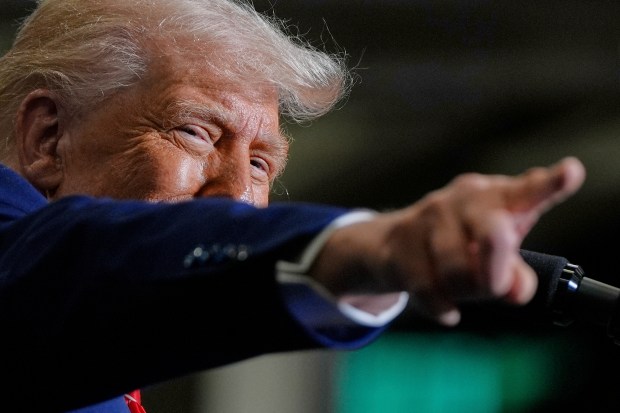UNITED NATIONS — The United Nations Security Council on Monday issued its first demand to halt the fighting in Gaza, calling for a cease-fire during the Muslim holy month of Ramadan in a vote that drew an immediate protest from the Israeli prime minister.
Prime Minister Benjamin Netanyahu canceled a planned visit to Washington by a high-level delegation and accused the U.S. of “retreating” from a “principled position” by allowing the vote to pass without conditioning the cease-fire on the release of hostages held by Hamas.
The resolution passed 14-0 after the U.S. decided not to use its veto power and instead abstained on the resolution, which also demanded the release of all hostages taken captive during Hamas’ Oct. 7 surprise attack in southern Israel. But the measure does not link that demand to the cease-fire during Ramadan, which ends April 9.
The Israeli delegation was to present White House officials with plans for an expected ground invasion of the strategic Gaza town of Rafah, where over 1 million Palestinian civilians have sought shelter from the war.
White House national security spokesman John Kirby said the U.S. had been “consistent” in its support for a cease-fire as part of a hostage deal.
“The reason we abstained is because this resolution text did not condemn Hamas,” Kirby said.
The vote comes after Russia and China vetoed a U.S.-sponsored resolution Friday that would have supported “an immediate and sustained cease-fire” in the Israeli-Hamas conflict.
The United States warned that the resolution approved Monday could hurt negotiations to halt hostilities by the U.S., Egypt and Qatar, raising the possibility of another veto, this time by the Americans.
Because Ramadan ends next month, the cease-fire demand would last for just two weeks, though the draft says the pause in fighting should lead “to a permanent sustainable cease-fire.”
U.S. Ambassador Linda Thomas-Greenfield said that the resolution “spoke out in support of the ongoing diplomatic efforts,” adding that negotiators were “getting closer to a deal for an immediate cease-fire with the release of all hostages, but we’re not there yet.”
“So today, my ask to members of this council and to member states in every region of the world is this speak out and demand unequivocally that Hamas accepts the deal on the table,” she said.
The resolution, put forward by the 10 elected council members, was backed by Russia and China and the 22-nation Arab Group at the United Nations.
Algeria’s U.N. ambassador, the Arab representative on the council, thanked the council for “finally” demanding a cease-fire.
“We look forward to the commitment and the compliance of the Israeli occupying power with this resolution, for them to put an end to the bloodbath without any conditions, to end the suffering of the Palestinian people.” he said. “It is the responsibility of the Security Council to ensure the implementation of the provisions of this resolution.”
Shortly before Monday’s vote, the elected members changed the final draft resolution to drop the word “permanent” from its demand that a Ramandan cease-fire will lead to “a permanent sustainable cease-fire,” apparently at the request of the United States.
Russia complained that dropping the word could allow Israel “to resume its military operation in the Gaza Strip at any moment” after Ramadan and proposed an amendment to restore it. That amendment was defeated because it failed to get the minimum nine “yes” vote — with three council members voting in favor, the United States voting against, and 11 countries abstaining.
Since the start of the war, the Security Council has adopted two resolutions on the worsening humanitarian situation in Gaza, but none has called for a cease-fire.
More than 32,000 Palestinians in Gaza have been killed during the fighting, according to the Gaza Health Ministry. The agency does not differentiate between civilians and combatants in its count, but says women and children make up two-thirds of the dead.
Gaza also faces a dire humanitarian emergency, with a report from an international authority on hunger warning March 18 that “famine is imminent” in northern Gaza and that escalation of the war could push half of the territory’s 2.3 million people to the brink of starvation.
The United States has vetoed three resolutions demanding a cease-fire in Gaza, the most recent an Arab-backed measure on Feb. 20. That resolution was supported by 13 council members with one abstention, reflecting the overwhelming support for a cease-fire.
Russia and China vetoed a U.S.-sponsored resolution in late October calling for pauses in the fighting to deliver aid, the protection of civilians and a halt to arming Hamas. They said it did not reflect global calls for a cease-fire.
They again vetoed a U.S. resolution Friday, calling it ambiguous and saying it was not the direct demand to end the fighting that much of the world seeks.
The vote became another showdown involving world powers that are locked in tense disputes elsewhere, with the United States taking criticism for not being tough enough against its ally Israel, even as tensions between the two countries rise.
In previous resolutions, the U.S. has closely intertwined calls for a cease-fire with demands for the release of Israeli hostages in Gaza. This resolution, using wording that’s open to interpretation, continued to link the two issues, but not as firmly.



